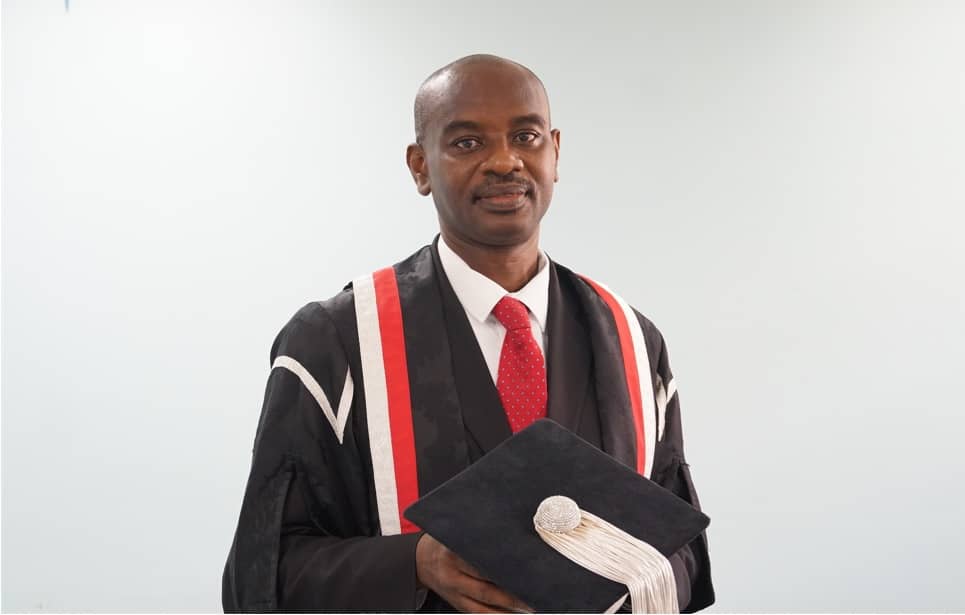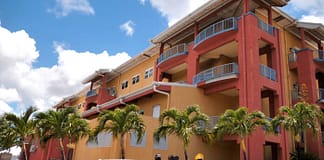
A LOOK AT ANTIGUA’S 2024 BUDGET
Introduction
As a relatively new resident in Antigua & Barbuda in my position as Principal of The UWI Five Islands campus Antigua & Barbuda I take this opportunity to express a few thoughts on the upcoming December 15, 2023, budget.
In assessing national budgets my academic training in Finance and my 16 years as a Director of the Central Bank of Barbados lead me to focus on the current economic context, historical tendencies in terms of the performance of the economy, long term policy targets and the primary balance.
The current economic context is one of an economy recovering rapidly from the economic ravages of the Covid 19 pandemic.
In 2020, Real Gross Domestic Product (Real Gross Domestic Product is the total value of all the goods and services a country produces adjusted to remove the effects of inflation), fell by 17.5%, rebounding by 6.6% and 8.5% in 2021 and 2022 respectively.
It will take Real GDP growth of at least 2.4% in 2023 just to recover the losses from the Covid 19 pandemic.
The economic losses from Covid 19 which wiped out the combined economic growth of the previous four years also had a devastating impact on the public finances since the economic decline reduced government revenues, while the nature of the pandemic required increased government expenditures.
The budgetary proposals can be assessed on whether they bolster the current economic recovery while taking steps to fix the hole Covid 19 blew in the public finances.
The historical tendencies in terms of the performance of the economy provide hope in this challenging context.
As shown in table 1 Antigua & Barbuda has an impressive record of economic growth over the last forty-five years achieving positive growth for 37 of the forty-five years being reviewed here (8 years of negative growth).
Table 1: Antigua & Barbuda’s Growth Rate in Real Gross Domestic Product (GDP)
| Year | Real GDP Growth (%) | Year | Real GDP Growth (%) | Year | Real GDP Growth (%) | Year | Real GDP Growth (%) | Year | Real GDP Growth (%) |
| 1978 | 4.4 | 1988 | 5.2 | 1998 | 4.7 | 2008 | 0.0 | 2018 | 6.8 |
| 1979 | 8.1 | 1989 | 5.3 | 1999 | 3.7 | 2009 | -12.0 | 2019 | 4.3 |
| 1980 | 8.2 | 1990 | 3.0 | 2000 | 6.2 | 2010 | -7.8 | 2020 | -17.5 |
| 1981 | 3.8 | 1991 | 2.2 | 2001 | -4.5 | 2011 | -2.0 | 2021 | 6.6 |
| 1982 | -0.1 | 1992 | 1.2 | 2002 | 1.0 | 2012 | 3.4 | 2022 | 8.5 |
| 1983 | 5.4 | 1993 | 5.3 | 2003 | 6.1 | 2013 | -0.6 | ||
| 1984 | 10.2 | 1994 | 6.7 | 2004 | 5.8 | 2014 | 3.8 | ||
| 1985 | 7.6 | 1995 | -4.4 | 2005 | 6.5 | 2015 | 3.8 | ||
| 1986 | 11.5 | 1996 | 6.6 | 2006 | 12.7 | 2016 | 5.5 | ||
| 1987 | 6.6 | 1997 | 5.5 | 2007 | 9.3 | 2017 | 3.1 | ||
| Source: International Monetary Fund | |||||||||
In terms of comparisons over the same time period, Barbados, Jamaica and Trinidad & Tobago recorded 16, 13 and 16 years of negative growth, while OCES neighbors, St. Kitts & Nevis and St. Lucia recorded 7 and 9 years of negative growth respectively.
The economic growth record in the five years prior to the pandemic was most impressive and the longer-term economic history outlined in table 1 provides cause for optimism that the economy can return to a sustained growth path in the wake of the Covid 19 pandemic.
I am heartened by the fact that since 1978 Antigua and Barbuda is yet to record a year of negative economic growth not preceded by either an external shock or a natural disaster. The budgetary measures can be assessed in terms of whether they bolster or impact negatively on the long-term growth path of the economy.
In terms of long-term policy targets, as a member of the Eastern Caribbean Currency Union, a major long term policy target for Antigua & Barbuda is achieving a Debt to GDP ratio of 60%.
Over the last 20 years as seen in table 2 Antigua & Barbuda’s Debt to GDP ratio fell from a high of 128.13% in 2003 to a low of 76.8% in 2019, which was an impressive performance before the economic ravages of the Covid 19 pandemic.
Table 2: Antigua & Barbuda’s Debt to GDP Ratio
| Year | Debt to GDP % | Year | Debt to GDP % |
| 2003 | 128.13 | 2013 | 101.06 |
| 2004 | 131.40 | 2014 | 100.17 |
| 2005 | 101.82 | 2015 | 86.92 |
| 2006 | 90.85 | 2016 | 82.61 |
| 2007 | 80.65 | 2017 | 83.86 |
| 2008 | 79.71 | 2018 | 78.95 |
| 2009 | 89.17 | 2019 | 76.8 |
| 2010 | 84.26 | 2020 | 96.51 |
| 2011 | 92.59 | 2021 | 92.49 |
| 2012 | 87.68 | 2022 | 84.54 |
| Source: Eastern Caribbean Central Bank | |||
The challenge for the Finance Minister is to get the public finances back on a path to a Debt to GDP ratio of 60% over some defined time horizon and the budgetary measures and address can be assessed on whether they provide clear direction on the path and timelines towards a Debt to GDP ratio of 60%.
Alongside the tendency for the economy to grow there is a tendency for Antigua & Barbuda’s public finances to show primary deficits as seen in table 3. The Primary Balance is the difference between Government’s revenue (what it is earning) and its non-interest expenditure (what it is spending, not including debt payments).
To put that in a household context, your “primary balance” would be the difference between your monthly salary and your monthly expenses, not including the money you spend repaying your debts, e.g. your mortgage or car loan. When the primary balance is positive (negative), that is, when revenue is more (less) than non-interest expenditure, that can also be referred to as a primary surplus (deficit).
A primary deficit implies that the government has to raise additional financing to cover debt service costs which almost inevitably means a further buildup of debt and/or arrears. A primary surplus on the other hand means that after other expenditures there is extra money available to go towards debt service, which includes interest on debt and the repayment of the principal on debt (amortization).
Primary surpluses are seen as being extremely important if a country is to be able to reduce its debt burden and avoid getting into a situation where debt service takes up a large and growing share of government revenues which can then knock the economy off the growth path it has enjoyed for much of its modern history (see table 3 for some data on the debt burden).
The presence of chronic primary deficits in an economy with consistent growth suggests large and growing government expenditures relative to the tax base and structure, challenges with revenue collection and possibly large tax expenditures (tax waivers).
Again, the budget can be assessed on the extent to which the measures address these issues in the structure of the public finances and move the public finances towards a primary surplus and an indication of what levels of surpluses are required to achieve a debt to GDP of 60% by a given date given growth expectations and a path to achieving such primary surpluses.
Table 3. Antigua & Barbuda Primary Balance & Debt Service (EC $)
| Year | Primary Balance | Interest | Amortization | Debt Service | Debt Service to Revenues |
| 2013 | $ (78.3) | $ 66.3 | $ 56.0 | $ 122.3 | 20.5% |
| 2014 | $ (5.0) | $ 88.9 | $ 97.5 | $ 186.4 | 28.1% |
| 2015 | $ 167.3 | $87.4 | $ 81.7 | $ 169.2 | 21.6% |
| 2016 | $ 88.9 | $103.7 | $ 137.2 | $ 240.9 | 31.0% |
| 2017 | $ 4.4 | $101.2 | $ 215.3 | $ 316.5 | 40.0% |
| 2018 | $ (31.6) | $107.0 | $ 187.7 | $ 294.7 | 36.1% |
| 2019 | $ (56.0) | $115.5 | $ 238.6 | $ 354.2 | 41.7% |
| 2020 | $ (110.5) | $ 94.5 | $ 339.0 | $ 433.5 | 55.2% |
| 2021 | $ (85.1) | $ 98.5 | $ 320.9 | $ 419.5 | 51.4% |
| 2022 | $ (48.8) | $122.2 | $ 281.1 | $ 403.3 | 44.2% |
| Source: Eastern Caribbean Central Bank | |||||
Conclusion
The Finance Minister faces a delicate and difficult balancing act to repair the public finances from the damage done by the Covid 19 pandemic and the history of primary deficits while not damaging the economic growth prospects of the economy.
I wish the Finance Minister and his team the best as they engage this herculean task and I look forward to my first budget debate in Antigua & Barbuda which promises to be a robust one.
Prof. C. Justin Robinson
Professor of Corporate Finance & Principal UWI Five Islands
Advertise with the mоѕt vіѕіtеd nеwѕ ѕіtе іn Antigua!
We offer fully customizable and flexible digital marketing packages.
Contact us at [email protected]

















Is this article about the budget or Covid-19?
I commend Professor Robinson on this article and look forward to hearing more from him and hopefully other persons so positioned as to give clarification to the general public about the financial state of our economy.
Perhaps there can be some sort of symposium held, maybe bi-annually, to give those persons in the public arena who may be interested but not sufficiently financially knowledgeable, the benefit of non-partisan information that would make us better informed citizens.
Just a thought.
@Joan Salmon December 13, 2023 At 9:22 am
I completely endorse your suggestion. I would hope that the technicians in the ministry would take part as well and that we can educate the masses without the politics of it. Antiguans are being dumb down everyday over economic figuyres everyday. I’m still waiting to hear what these cronies like Brix have to say about this Caribbean Intellectual, that we have the pleasure of having him amongst us.
Brix lets hear from you.
@From The Sideline
I so wish he was Antiguan so that we could recruit him for prime minister. Are there any such scholars in Antigua? Way them be?
To be a politician you have to be of a special breed. i for one can not take the constant bashing by an opposition using all kinds of lies and innuendos. Especially when this public jobs don’t pay you not even half as what you would earn in the private sector. Therefore the public sector doesn’t attract the creme de la creme. Professional People working in the public sector are really to be praised. Unless they work as consultants then and onlyn then the government has to pay them premium consultancy fees.
The man is an intellect, not a politician.
A comprehensive, informative, balanced article so well written that the layman can understand. I endorsed the sentiments expressed by Ms Salmon.
Thank you Professor Robinson!
Brix and company. You guys are real cowards. To date you guys cannot make any comments on this independently produce analysis of the state of the Antigua and Barbuda Finances, All the stats are there for you, going back to 2003 showing the Debt to GDP ratio and the Antigua & Barbuda Primary Balance & Debt Service from 2013 through 2022. Well perhaps you do not understand the analysis presented by the distinguish Professor, but as Oswald Francis said, “A comprehensive, informative, balanced article so well written that the layman can understand.”
But I guess it is still above you guys’ IQ. Your constant lies have once again been exposed by this article. Especially the one called Audley Philip that doesn’t understands a thing about finance and economics but wants to write articles about that. All I can say to him “Shoemaker, Stick to Thy Last!”. Stop making a fool of yourself trying to be relevant.
Comments are closed.